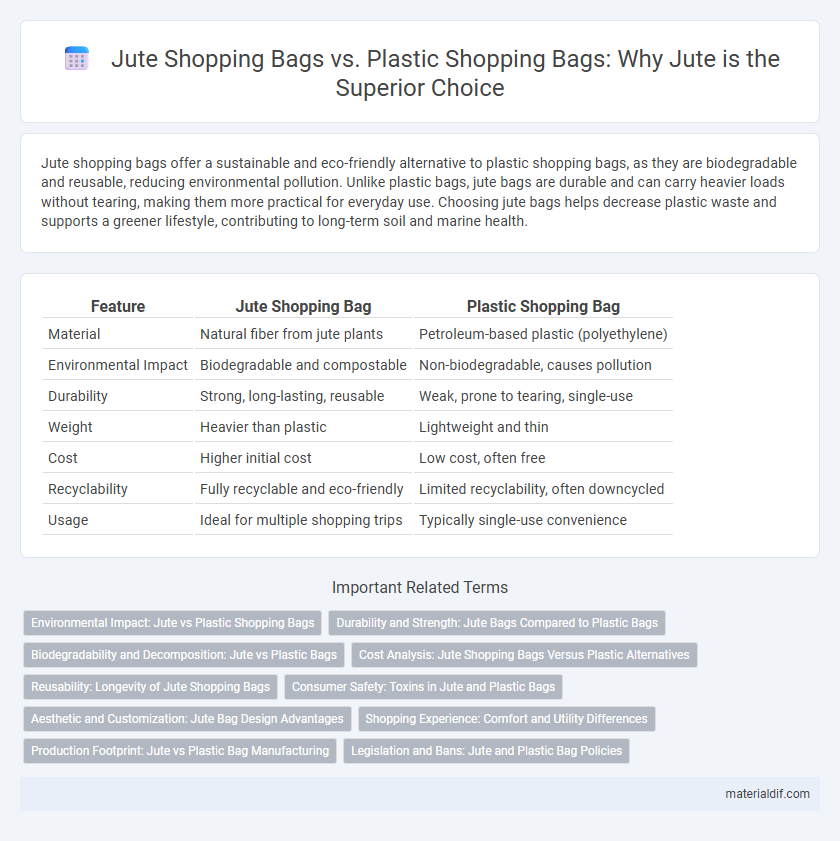Jute shopping bags offer a sustainable and eco-friendly alternative to plastic shopping bags, as they are biodegradable and reusable, reducing environmental pollution. Unlike plastic bags, jute bags are durable and can carry heavier loads without tearing, making them more practical for everyday use. Choosing jute bags helps decrease plastic waste and supports a greener lifestyle, contributing to long-term soil and marine health.
Table of Comparison
| Feature | Jute Shopping Bag | Plastic Shopping Bag |
|---|---|---|
| Material | Natural fiber from jute plants | Petroleum-based plastic (polyethylene) |
| Environmental Impact | Biodegradable and compostable | Non-biodegradable, causes pollution |
| Durability | Strong, long-lasting, reusable | Weak, prone to tearing, single-use |
| Weight | Heavier than plastic | Lightweight and thin |
| Cost | Higher initial cost | Low cost, often free |
| Recyclability | Fully recyclable and eco-friendly | Limited recyclability, often downcycled |
| Usage | Ideal for multiple shopping trips | Typically single-use convenience |
Environmental Impact: Jute vs Plastic Shopping Bags
Jute shopping bags significantly reduce environmental pollution compared to plastic bags due to their biodegradable and compostable properties, which minimize landfill waste and soil contamination. The production of jute bags consumes less energy and emits fewer greenhouse gases, promoting sustainable agriculture and reducing carbon footprints. In contrast, plastic shopping bags contribute to long-lasting pollution, harming marine life and ecosystems, and require hundreds of years to degrade, exacerbating global plastic waste challenges.
Durability and Strength: Jute Bags Compared to Plastic Bags
Jute shopping bags exhibit superior durability and strength compared to plastic bags, with natural fibers that resist tearing and wear during repeated use. Unlike plastic bags, which often degrade and lose integrity quickly, jute bags maintain structural integrity even under heavy loads. The robust nature of jute fibers ensures a longer lifespan, making them a sustainable and reliable alternative for carrying groceries and daily items.
Biodegradability and Decomposition: Jute vs Plastic Bags
Jute shopping bags are highly biodegradable, decomposing naturally within 1 to 6 months, which significantly reduces environmental impact compared to plastic shopping bags that can take up to 1000 years to break down. The natural fibers in jute enable microbial degradation without releasing toxic chemicals, whereas plastic bags persist in landfills and oceans, causing long-term pollution and harm to wildlife. Choosing jute bags supports sustainable waste management and reduces microplastic contamination, promoting a healthier ecosystem.
Cost Analysis: Jute Shopping Bags Versus Plastic Alternatives
Jute shopping bags typically have a higher upfront cost, ranging from $1 to $3 per bag, compared to plastic shopping bags, which cost around $0.01 to $0.05 each. However, jute bags offer long-term savings due to their durability and reusability, potentially lasting hundreds of shopping trips, whereas plastic bags are generally single-use and often incur additional disposal or environmental costs. Factoring in these lifecycle costs, jute bags present a more economical and sustainable option over time despite the initial price difference.
Reusability: Longevity of Jute Shopping Bags
Jute shopping bags offer superior reusability due to their durable fiber composition, enabling them to withstand hundreds of cycles of use without significant wear or tear. Unlike plastic shopping bags, which typically degrade or become unusable after a few uses, jute bags maintain their structural integrity over extended periods, reducing the need for frequent replacements. The longevity of jute bags contributes to environmental sustainability by minimizing waste and lowering plastic pollution.
Consumer Safety: Toxins in Jute and Plastic Bags
Jute shopping bags are free from harmful toxins and chemicals, making them a safer choice for consumers concerned about exposure to hazardous substances. In contrast, plastic shopping bags often contain toxic additives like phthalates and BPA, which can leach into products and pose health risks. Choosing jute bags reduces the risk of chemical contamination and supports safer, eco-friendly consumer habits.
Aesthetic and Customization: Jute Bag Design Advantages
Jute shopping bags offer superior aesthetic appeal with their natural fiber texture and earthy tones, creating a rustic yet sophisticated look that plastic bags lack. Customization options for jute bags include eco-friendly printing, embroidery, and dyeing, allowing brands to showcase unique designs and logos with vibrant colors that maintain durability. The sturdy material holds shape better than flimsy plastic, enhancing design presentation and customer perception of quality.
Shopping Experience: Comfort and Utility Differences
Jute shopping bags offer a comfortable grip and breathable texture, reducing hand fatigue during extended use compared to plastic bags which often have thin, hard handles that can dig into the skin. The durable, spacious design of jute bags supports carrying heavier items without tearing, enhancing utility for grocery trips and everyday shopping. Plastic bags lack rigidity and ventilation, making them less comfortable and more prone to stretching or breaking under heavy loads.
Production Footprint: Jute vs Plastic Bag Manufacturing
Jute shopping bags have a significantly lower production footprint compared to plastic bags, as they are made from natural, renewable fibers requiring less energy and water in cultivation. Plastic bags are primarily produced from non-renewable petroleum resources, involving energy-intensive processes that emit higher greenhouse gases and generate toxic byproducts. The biodegradability and minimal chemical use in jute production contribute to its environmentally friendly manufacturing profile over plastic bag production.
Legislation and Bans: Jute and Plastic Bag Policies
Legislation on shopping bags increasingly favors jute bags due to their biodegradability and reduced environmental impact, prompting many countries to implement bans or taxes on single-use plastic bags. Policies such as India's Plastic Waste Management Rules and the European Union's directive to reduce plastic bag usage emphasize shifting toward sustainable alternatives like jute. These regulations not only encourage manufacturers to adopt eco-friendly materials but also promote consumer behavior changes by highlighting jute bags as a legal and environmentally responsible option.
Jute Shopping Bag vs Plastic Shopping Bag Infographic

 materialdif.com
materialdif.com